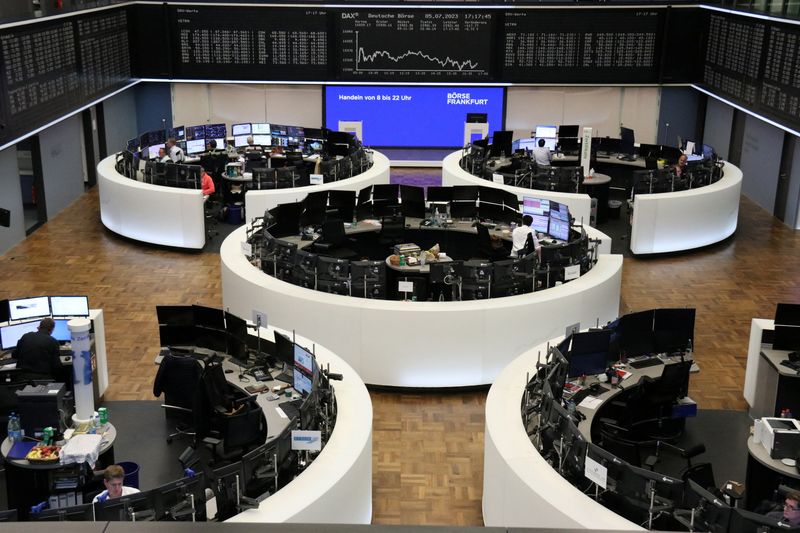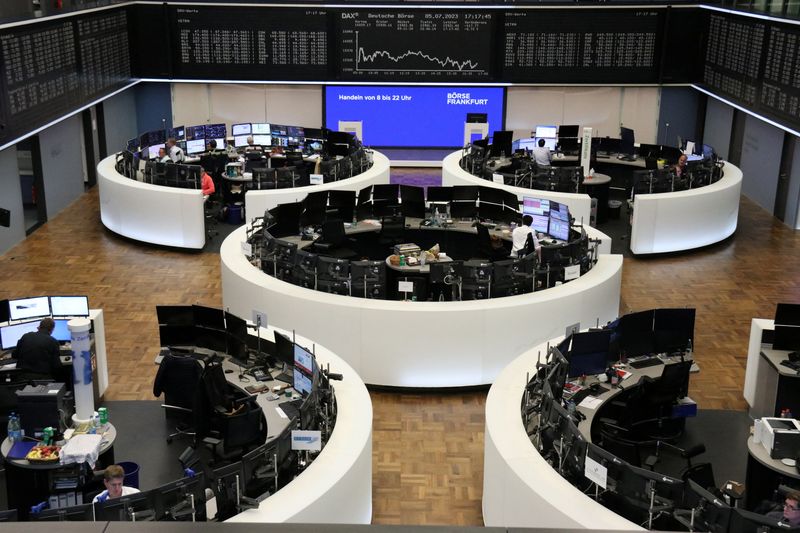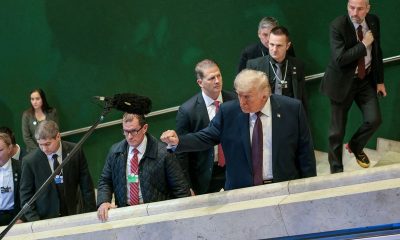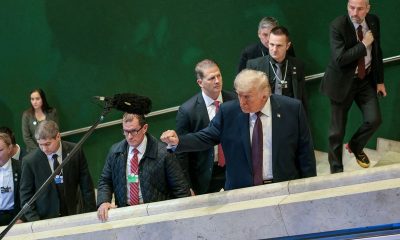Economy
European shares end higher after worst week in nearly four months


© Reuters. The German share price index DAX graph is pictured at the stock exchange in Frankfurt, Germany, July 5, 2023. REUTERS/Staff
By Shreyashi Sanyal
(Reuters) -European shares eked out gains on Friday as data pointing to slowing U.S. job growth eased concerns about interest rate hikes by the Federal Reserve but did little to change the main index’s worst weekly showing in almost four months.
The STOXX 600 rose 0.1% by 1615 GMT, turning positive midway through the session after data showed the U.S. economy added the fewest jobs in 2-1/2 years in June.
However, persistently strong U.S. wage growth pointed to still tight labour market conditions that cemented bets the Fed will resume raising interest rates, later this month.
Traders stuck to bets the Fed will raise its benchmark interest rate this month to a 5.25%-5.5% range, but were sceptical of further hikes beyond that.
“This doesn’t change our view that the Fed is poised to continue its hiking cycle this month,” said Candice Tse, global head of strategic advisory solutions at Goldman Sachs (NYSE:) Asset Management.
“The US economy is still growing below potential, inflation continues to decline, but still remains above the Fed’s 2% target, keeping the Fed on track for another 25 bps hike.”
European equities took a hit this week as hawkish messages from central banks pushed up yields and drove investors to believe rates will remain high for longer, and as bleak economic readings from the euro zone and China fed concerns of a global slowdown.
The STOXX 600 fell 3.1% for the week, its worst performance since mid-March.
For the day, the chemicals sector led gains with a 1.6% rise.
Sectors, including construction & materials, healthcare and travel & leisure, led falls with declines of over 4% each for the week, while defensive real estate remained the sole gainer with a 0.4% rise.
Earlier in the day, German industrial production fell 0.2% in May compared with the previous month. Analysts polled by Reuters had predicted that output would stagnate in May.
Coca Cola HBC AG (LON:) jumped 5.1%, after it raised its 2023 profit expectation.
Clariant rose 4.9% after paring losses as the company’s preliminary second-quarter results showed weaker sales and outlook for current financial year.
Top loser on the STOXX 600, OSB Group plunged 28.8%, to hit its lowest since November 2020 after the British lender flagged an up to 180 million pound ($229.4 million) hit as customers refinance their mortgages earlier than forecast.
Comments from European Central Bank President Christine Lagarde will be monitored later in the day.
Economy
Russian central bank says it needs months to make sure CPI falling before rate cuts -RBC


© Reuters. Russian Central Bank Governor Elvira Nabiullina attends a news conference in Moscow, Russia June 14, 2019. REUTERS/Shamil Zhumatov/File Photo
MOSCOW (Reuters) – Russia’s central bank will need two to three months to make sure that inflation is steadily declining before taking any decision on interest rate cuts, the bank’s governor Elvira Nabiullina told RBC media on Sunday.
The central bank raised its key interest rate by 100 basis points to 16% earlier in December, hiking for the fifth consecutive meeting in response to stubborn inflation, and suggested that its tightening cycle was nearly over.
Nabiullina said it was not yet clear when exactly the regulator would start cutting rates, however.
“We really need to make sure that inflation is steadily decreasing, that these are not one-off factors that can affect the rate of price growth in a particular month,” she said.
Nabiullina said the bank was taking into account a wide range of indicators but primarily those that “characterize the stability of inflation”.
“This will take two or three months or more – it depends on how much the wide range of indicators that characterize sustainable inflation declines,” she said.
The bank will next convene to set its benchmark rate on Feb. 16.
The governor also said the bank should have started monetary policy tightening earlier than in July, when it embarked on the rate-hiking cycle.
Economy
China identifies second set of projects in $140 billion spending plan


© Reuters. FILE PHOTO: Workers walk past an under-construction area with completed office towers in the background, in Shenzhen’s Qianhai new district, Guangdong province, China August 25, 2023. REUTERS/David Kirton/File Photo
SHANGHAI (Reuters) – China’s top planning body said on Saturday it had identified a second batch of public investment projects, including flood control and disaster relief programmes, under a bond issuance and investment plan announced in October to boost the economy.
With the latest tranche, China has now earmarked more than 800 billion yuan of its 1 trillion yuan ($140 billion) in additional government bond issuance in the fourth quarter, as it focuses on fiscal steps to shore up the flagging economy.
The National Development and Reform Commission (NDRC) said in a statement on Saturday it had identified 9,600 projects with planned investment of more than 560 billion yuan.
China’s economy, the world’s second largest, is struggling to regain its footing post-COVID-19 as policymakers grapple with tepid consumer demand, weak exports, falling foreign investment and a deepening real estate crisis.
The 1 trillion yuan in additional bond issuance will widen China’s 2023 budget deficit ratio to around 3.8 percent from 3 percent, the state-run Xinhua news agency has said.
“Construction of the projects will improve China’s flood control system, emergency response mechanism and disaster relief capabilities, and better protect people’s lives and property, so it is very significant,” the NDRC said.
The agency said it will coordinate with other government bodies to make sure that funds are allocated speedily for investment and that high standards of quality are maintained in project construction.
($1 = 7.1315 renminbi)
Economy
Russian central bank says it needs months to make sure CPI falling before rate cuts -RBC


© Reuters. Russian Central Bank Governor Elvira Nabiullina attends a news conference in Moscow, Russia June 14, 2019. REUTERS/Shamil Zhumatov/File Photo
MOSCOW (Reuters) – Russia’s central bank will need two to three months to make sure that inflation is steadily declining before taking any decision on interest rate cuts, the bank’s governor Elvira Nabiullina told RBC media on Sunday.
The central bank raised its key interest rate by 100 basis points to 16% earlier in December, hiking for the fifth consecutive meeting in response to stubborn inflation, and suggested that its tightening cycle was nearly over.
Nabiullina said it was not yet clear when exactly the regulator would start cutting rates, however.
“We really need to make sure that inflation is steadily decreasing, that these are not one-off factors that can affect the rate of price growth in a particular month,” she said.
Nabiullina said the bank was taking into account a wide range of indicators but primarily those that “characterize the stability of inflation”.
“This will take two or three months or more – it depends on how much the wide range of indicators that characterize sustainable inflation declines,” she said.
The bank will next convene to set its benchmark rate on Feb. 16.
The governor also said the bank should have started monetary policy tightening earlier than in July, when it embarked on the rate-hiking cycle.

 Forex4 years ago
Forex4 years agoForex Today: the dollar is gaining strength amid gloomy sentiment at the start of the Fed’s week

 Forex3 years ago
Forex3 years agoUnbiased review of Pocket Option broker

 Forex3 years ago
Forex3 years agoDollar to pound sterling exchange rate today: Pound plummeted to its lowest since 1985

 Forex3 years ago
Forex3 years agoHow is the Australian dollar doing today?

 Cryptocurrency3 years ago
Cryptocurrency3 years agoWhat happened in the crypto market – current events today

 World3 years ago
World3 years agoWhy are modern video games an art form?

 Commodities3 years ago
Commodities3 years agoCopper continues to fall in price on expectations of lower demand in China

 Economy3 years ago
Economy3 years agoCrude oil tankers double in price due to EU anti-Russian sanctions

























